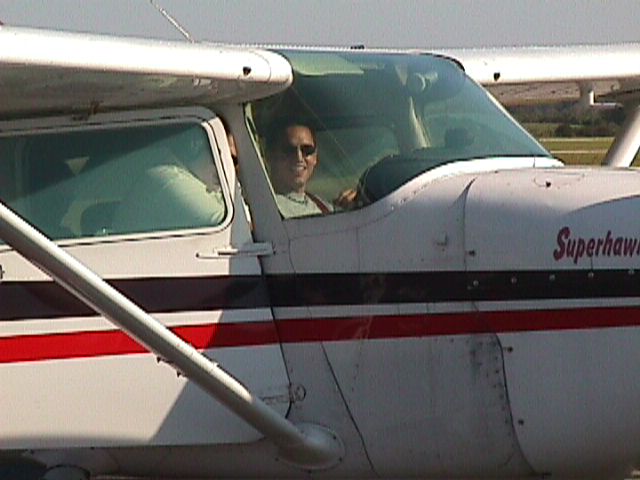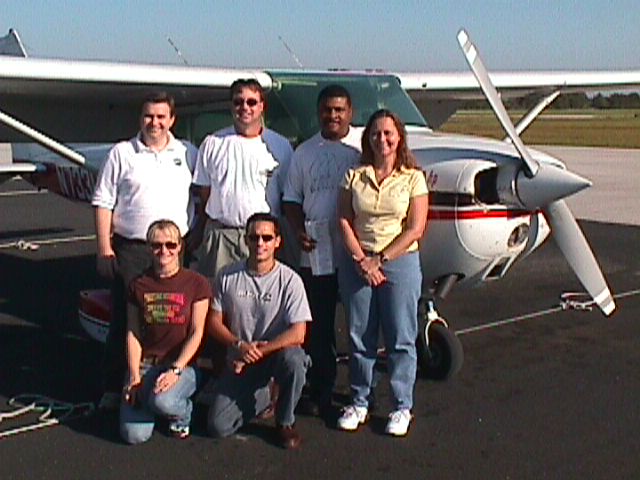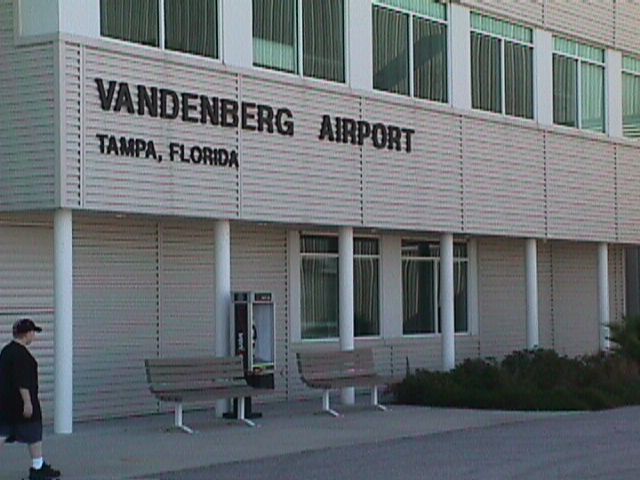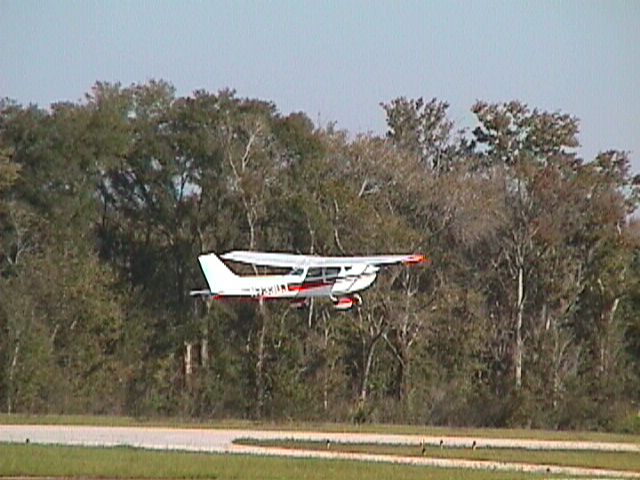 I'm
not gonna yammer on about how great ground school is. Let's face
it, you don't lay awake in bed at night and dream of flying a desk
and textbook. But before we run, we learn to walk, and you will
have to take a certain amount of ground instruction in order to
pass your written exam (Knowledge Exam). Accept it and endeavor
to make the most of it. I'm
not gonna yammer on about how great ground school is. Let's face
it, you don't lay awake in bed at night and dream of flying a desk
and textbook. But before we run, we learn to walk, and you will
have to take a certain amount of ground instruction in order to
pass your written exam (Knowledge Exam). Accept it and endeavor
to make the most of it.
I really enjoyed
mine for the most part. Where To Start? Well, there's more than
one way to go about getting your ground instruction, and at least
two definite schools of thought on the subject. I know which way
I went, and I have friends who took the other approach and it didn't
seem any better or worse either way in the end, so I'll tell you
both ways and you can decide for yourself.
The first way
is to take Ground Instruction from your FBO where you are taking
your flying lessons. I went the other way. The second way. I saw
that the local Community College offered courses for both IFR and
VFR, so I checked it out.
Turns out that
you need an endorsement from a CFI to even take the test, and this
course came with the endorsement. Better still, these courses usually
are subsidized by the Govt. so they are a tremendous value for the
student. I signed up and the course cost me about $300 complete
with the deluxe Jeppessen Student Kit. This includes a flight bag,
A-6B, Plotter, all required books, FAR-AIM. Pretty much everything
you need. There is also no reason why you can't use both methods,
too. Whatever works for you.
I met the instructor
and the rest of the class the first night, and because it was a
small group and space at community colleges is always in short supply,
we were given the executive lounge to meet in. Our instructor was
a CFII and was also a teacher by day, so he had first-hand knowledge
and knew how to pass it on. I've included a couple pics of the group
on this page. I think we were probably as average a group as any,
so it'll give you an idea of what to expect. We met two nights a
week, for about 6 or 8 weeks. We also went on a couple field trips,
which were extremely helpful. Not the least of which, were the FAA
Safety Awareness Program meetings that are held all over the country
on the at various locations. These are great places to meet other
students and pilots, and they always have a different topic and
speaker. Best of all, they are free to attend, and you get the benefits
of the other pilots' experience.
Anyway, you
don't have to wait until you are finished with Ground School to
start flying, but you can't get your license until after you've
passed the written, and there is a lot of studying involved, so
get started early. You will learn about lift and drag, flight restrictions
and regulations, various aircraft types, weather, navigation, mechanical
knowledge and more. Don't miss any classes and don't let any of
the homework or studying go for too long, or it'll be tuff to catch
up. My instructor's name was Darren Smith, and I felt very prepared
when I took my test.
 |
Another
field trip Darren took us on was to the local airport to do
a preflight on a Cessna 172. Darren vehemently recommended the
172 as a trainer. I took a slightly different route, but would
have to agree with him now. We circled that thing like buzzards
on road kill, and I took notes on everything. I later used them
along with the POH (pilot operator's handbook that must be available
in every plane) to create my own preflight check list. This
procedure is not just a formality. You are betting your life
and anyone else's on board on the quality of your preflight.
Take nothing for granted. Since I've been flying, I've identified
a broken horizontal stabilizer spar(!), low oil, low tire pressure,
inoperative beacon light, bad battery and bad magneto - but
that was on pre-takeoff check, which comes later. Rental planes
take a real beating, so check closely. |
Since we met
in the evenings and rarely had time to eat before class, we started
taking turns bringing in food for the bunch. I started by buying
a couple of pizzas and showing up a little early. Bring it up with
your class, it helps build fellowship. I also spent an hour here
and there with my flying instructor going over the finer points
of flying between flying lessons. These are inevitable, so don't
fight it. You need this stuff for specific tasks and tests you'll
be taking in the plane. But these hours are expensive. At $30 -
$40 per hour at the FBO, you wanna keep these to a minimum. They
will usually happen just before you solo, just before you start
working on your cross-country, and mostly before you take your check
ride (Practical Exam). Remember that your instructor's rep is on
the line here too, so try to make the most of it and be pleased
he/she is pulling so hard for you to be prepared. I promise that
no matter how much they try to prepare you, that Check Pilot will
still find a way to catch you off guard. They are the cream of the
crop, and know tricks of the trade that even the most seasoned CFII
hasn't thought of yet, but that's another chapter.
The Ground School
class was very helpful and made it quite a bit easier to pass the
written test. I diddled around and didn't take my written until
after the first endorsement ran out, so I had to get my current
flying instructor to give me another one. This was made much easier
to ask for since I'd done about 5 hours of ground with him. This
topic comes up again in the chapter about choosing a Flight Instructor.
All in all, I really enjoyed VFR Pilot Ground School with Darren
Smith, CFII. I was sorry when it ended, and I'll probably take the
IFR class this year. Study hard and keep up. This is the first step
to the dream and it's not an easy one, but when you're past it there's
only the fun stuff left to do.
I would also
recommend that you buy your instructor some small token of your
appreciation at the end of the course. I bought mine a $50.00 gift
certificate to Outback Steakhouse. These guys can't possibly be
in it for the money, so be thankful that they shared their knowledge
with you when you needed it.
 |
You
only have to get 70% to pass the written, and I passed with
an 86% on the first try. It was pretty intimidating, and you
have to go to a special place to take the test, but the people
were really nice and it helped take some of the pressure off.
I had gotten my physical several months before that, so by now
I was ready to solo and fly some cross country! And by the way,
yes they do perform a drug screen test when you take your physical. |
| Here's
a shot of one of my classmates on his first flight ever, after
the pre-flight. He had booked time with our instructor, who
als gives flying lessons. Two of our group were Air Force from
McDill, one was CAP on the weekends as a spotter, one was a
maint. engineer at one of the big hotels downtown, and another
was a rich kid from South Florida, and me. This is Vandenburg
Airport in Tampa, FL. |
 |
|

